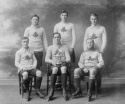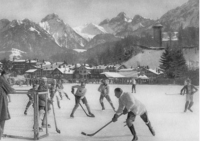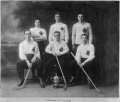Oxford Canadians
| Oxford Canadians | |
|---|---|
| City: | Oxford, England |
| League: | |
| Operated: | 1906–1914 |
| Colors: | White, red |
The Oxford Canadians were an English amateur ice hockey team. They played during the early 20th century, and were formed from Rhodes Scholars who were attending Oxford University. They were the first ice hockey team representing Canada to wear a red maple leaf on their uniform. They enjoyed considerable success, winning British and European competitions.
History
The team was founded in 1906, and was composed primarily of Canadian students from Oxford University attending with a Rhodes Scholarship. Initially the Rhodes Scholars played for the Oxford University Ice Hockey Club, but were banned from playing in varsity matches against Cambridge in order to prevent "a massacre".
The more physical, Canadian style of play employed by the club was met by some hostility in England. The December 17, 1907, edition of The Times said that ice hockey “as played in Canada at the present time, is the roughest and most dangerous of games … old fashioned strategy has been thrown aside … and Canadian methods are being sedulously practised.”
The club were the English champions in 1907 and 1910 and subsequently participated in the 1910 European Championships. They played three games, which were not considered to be part of the official competition, and beat Switzerland 8–1, Germany 4–0 and Belgium 6–0. They did not play Princes Ice Hockey Club, who were representing Great Britain in the tournament. Great Britain won the tournament, but the Oxford Canadians were accepted as European Champions owing to their success in the competition.
The Oxford Canadians began wearing a red maple leaf on their uniforms, the first hockey club representing Canada to do so. The maple leaf has been one of Canada's symbols since as early as the 18th century, and in 1965 the national flag of Canada was adopted with a maple leaf on it.
The club became affiliated to the International Ice Hockey Federation (LIHG) in 1911. They were named English champions again in 1911, and participated in the 1912 LIHG Championships, which were unofficially considered to be "World Championships". The Oxford Canadians were the only "non-European" participants in the tournament, in which they finished second behind Berliner Schlittschuhclub, who were representing Germany in the competition. The club were the English champions for the fourth and final time in 1913.
The Oxford Canadians’ exciting and rugged style of play was instrumental in the LIHG formally adopting the Canadian rules of ice hockey on March 14, 1911. The tours embarked upon around Europe by the Canadians played a crucial role in these rules being adopted.
In 1913 Oxford Canadian goaltender Gustave Lanctot, described European ice hockey as a "sport of nobles" at which spectators wore full evening dress and dined sumptuously at candlelit, rink-side tables; the referees wore black tie and smoking jackets and concluded that it was "certainly not a people's game" in Europe.
Ice hockey was suspended in the United Kingdom following the outbreak of the First World War in 1914. When the sport resumed again in 1920, the Rhodes Scholars were allowed to participate in varsity matches again, and the Oxford Canadians ceased to compete, merging to make a "combined" university side.
Team Photos
| This page uses Creative Commons Licensed content from Wikipedia (view authors). |



